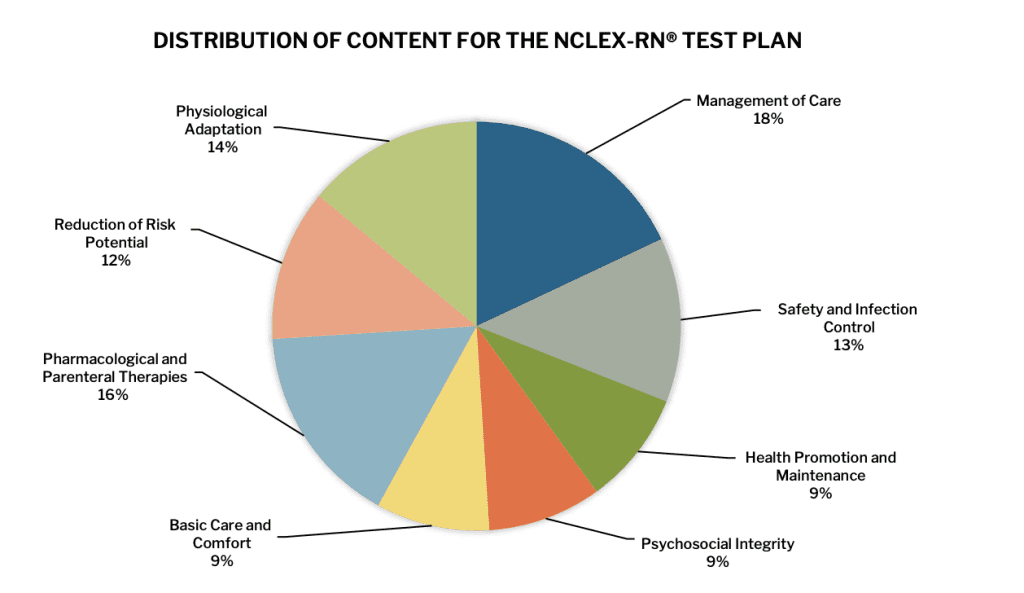Congratulations on finishing your nursing school journey! You were accepted into nursing school, took all of the exams, and gained many hours of experience through clinical practice. But, there’s one thing left to do: take the NCLEX!
If you’re like me, you might be feeling overwhelmed trying to figure out how to study for the NCLEX. It’s okay to feel a bit stressed over the exam, but realize that you’ve already done the hard part by gaining the knowledge you need to pass the NCLEX. Now, let us help you get into the right mindset to actually take the exam!
In this post, we’ll walk you through how to study for the NCLEX and become a real-deal nurse. Let’s get you started by answering some FAQs about how to prepare for the exam.
6 FAQs About Studying for the NCLEX
1. How long should you study for the NCLEX?
Try to aim for about 2-3 months of NCLEX review before you sit for the exam. You can start studying before the date is set, as long as you have an idea of when you’ll take the test.
Creating a study plan will be helpful to stay on track for your content review goals. You may have days where you’ll study more, days you’ll study less, and days where you won’t study at all. It’s all okay, just keep checking in with yourself!
2. Which topics are on the NCLEX?
When you take the NCLEX, you’ll be tested on eight main topics. It’s helpful to know that these topics are also known as “client needs categories,” because the core of each question will be how we’ll meet our clients’ needs!
These categories are:
| Health promotion and maintenance (6-12%) |
| Psychosocial integrity (6-12%) |
| Safe and effective care environment: – Management of care (15-21%) – Safety and infection control (10-16%) |
| Physiological integrity: – Basic care and comfort (6-12%) – Pharmacological and parenteral therapies (13-19%) – Reduction of risk potential (9-15%) – Physiologic adaptation (11-17%) |

Essentially, you’ll have to use your clinical judgment to promote safety, health, and evidence-based care. If it seems like a lot, I want you to remember these are all things you’ve already done in nursing school!
Heads up! If you’re taking the NCLEX-RN after April 2026, your exam will follow a different NCLEX Test Plan. Check it out here!
3. What resources should I use to study for the NCLEX?
Alright, you know when to study and what to study, now let’s talk about which resources you should look at for NCLEX review!
It can be pretty overwhelming to pick your study materials. You’ll probably find a lot of study sources or hear what your peers are using to study.
Ultimately, you can use your textbooks, any notes or flashcards that you’ve made, an NCLEX question book or database, educational videos, and social media (check ours out below).
Having so many ways to study is great, but you may want to narrow your study materials down to two or three sources. Think about how you like to learn, what the study materials offer, and what support you need to prepare for the NCLEX. For instance, there are a lot of great NCLEX question books available, but you may want to pair them with a content review course like ours!
If you don’t know where to start finding study materials, we have amazing resources over at Blueprint, specifically our NCLEX Complete Self-Prep Package! The package includes 23 hours of video lessons, 2,000 Qbank questions, personalized study planner, and more—plus, it’s completely free for 60 days. 🤩
We also have knowledge checks on our YouTube channel (@blueprintnursing) and TikTok (@blueprintnursing).
4. How do I make a study schedule / study guide?
Now that we’ve discussed study materials, let’s talk about study schedules! As we said earlier, 2-3 hours of study time a day for 2-3 months is a good timeline to work with.
With your study materials in mind, create a schedule that’ll fit your needs. Not everyone will need the same amount of review on the same subjects. I remember reviewing respiratory content more than cardiac content.
Join a Study Group or Course
If you’re not sure where to focus your studies, you may want to try a live study group to review all of your nursing school content. After reviewing the content, you can note which areas you felt needed more focus than others.
If live study groups aren’t an option, using a course like our NCLEX crash course may be the way to go. The crash course stretches over the span of a month, so you have a month of scheduled study time ready for you to use! The idea is to review the content over a month and then use the remaining time to study areas that you want to focus on.
Personally, I studied content more than I practiced questions at first, and then I slowly shifted towards more practice questions than content review the closer I got to the NCLEX.
5. How do I stick to my NCLEX study plan?
It may be helpful to treat your study hours like work. Log the hours in your planner or phone’s calendar like you would appointments or scheduled shifts. Try to schedule your study sessions at the time of day you’re most productive.
Note which content you’ll aim to cover that day or how many questions you’ll try to answer. Don’t forget to add “days off” and study breaks into your schedule! I know I had a hard time putting down my notes before my NCLEX, but my brain always felt refreshed after I took some time off.
Remember Your “Why”
While scheduled study sessions are helpful in sticking to study plans, they aren’t perfect. Another thing I like to do is reflect on the “why” behind my study plan. My “why” consisted of everything from remembering that if I could get into nursing school, I could pass this exam to just imagining my name with “RN” behind it.
I let it be my mantra to rally my energy and effort towards NCLEX review. Think of your “why” and write it down, have someone text it to you regularly, or just say it to yourself to keep your head in the game! (My “why” consisted of everything from remembering that if I could get into nursing school, I could pass this exam to just imagining my name with “RN” behind it).
Be Kind to Yourself
Also, forgive yourself if you miss a study day or have a day of review that was a struggle. Study plans will have hiccups and mishaps. That’s okay! They won’t make or break your path to becoming a real-deal nurse. Lastly, find your support system. How your support system supports you is up to you! They can help you study your material, check on your progress in your study plan, or simply just be there for you to talk to.
6. I have anxiety about the NCLEX. What can I do to manage it?
How are we feeling so far? We’ve covered a lot here, and I know it can feel pretty overwhelming. That’s perfectly normal. Anxiety and stress over the NCLEX can be tough to manage. Try to have a couple of anxiety-mitigating techniques in mind for when you start your NCLEX review.
Think of it like having a coping mechanism “bank.” When you’re feeling stressed or overwhelmed, you can readily “withdraw” your anxiety-management technique for use! These techniques can be short walks, meditation, listening to your music at the loudest volume, or joining our Facebook group (where you’ll find support from your peers).
The important thing is to have a plan in place for when you feel overloaded.
Final Thoughts: How to Study for the NCLEX
Okay, here we are! I know we’ve talked about a lot here, so here are the main takeaways (and then some):
- Aim for 2-3 months of NCLEX review
- Pick 2-3 resources that you’ll use in your review
- Create a study plan (including days off)
- Don’t cram the night before the NCLEX (in fact, take the day off);
- Check out Blueprint Nursing’s resources!
Try everything we’ve mentioned and use what you like! And if you’re looking for even more (free!) content to help you pass the NCLEX-RN, check out these other posts on the Blueprint Nursing blog:





